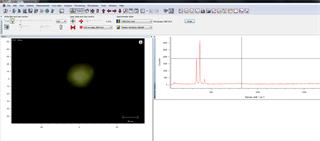Combining Raman microscopy with scanning electron microscopy (SEM) to study inorganic and mineral samples at the Geological Institute of Romania, Bucharest
6th January 2017
The Geological Institute of Romania, located in Bucharest, was founded in 1906. It is famous for its museum which hosts a collection of more than 80,000 samples of rocks, fossils and minerals from all over Romania.
Oana-Claudia Barbu and Daniel Bîrgăoanu are both PhD students and research assistants in the electron microscopy laboratory, known as MICROCOSMOS, where they study inorganic and mineral samples. They use Renishaw's structural and chemical analyser (SCA) interface to bring the Raman analysis capabilities of the inVia™ confocal Raman microscope to their scanning electron microscope (SEM). The inVia and SCA interface provide an in-SEM analytical technique that allows co-located chemical information and the flexibility of a fully functioning Raman microscope.
Ms Barbu commented, “This allows us to perform high resolution analysis on geological samples using energy dispersive spectroscopy (EDS) and Raman spectroscopy. Our Zeiss SEM is also equipped with electron back scattering (EBSD) and wavelength dispersive (WDS) detectors to give even better correlation of results. The system is easy to use and has user-friendly analysis software (WiRE 4™) that provides us with high definition chemical images from our very large Raman datasets. We greatly appreciate the strong support we have received from Renishaw.”
An example, typical of their work, is the study of mining waste to better understand its composition. In both the Raman spectrum and EDS analysis on the right, the metallic mineral content is identified as pyrite (iron sulphide, FeS2).
-
 Raman spectrum and EDS analysis of pyrite
Raman spectrum and EDS analysis of pyrite
In both the Raman spectrum and EDS analysis, the metallic mineral content is identified as pyrite.
Downloads
For further images, videos, company biographies or information on Renishaw and its products, visit our Media Hub.

